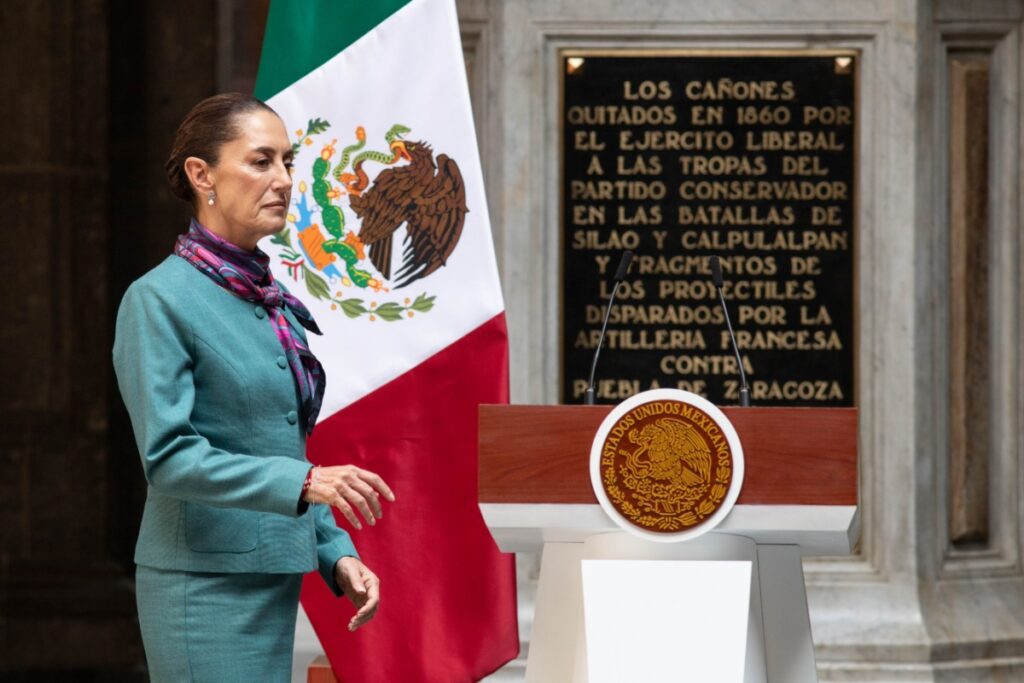President Claudia Sheinbaum said on Wednesday that she has filed a criminal complaint against a man who groped her while she was walking from Mexico’s National Palace to the Education Ministry in central Mexico City. Video of the encounter, recorded as she paused to greet people along the route, shows a man approaching from behind and touching the president before a government aide intervened. Sheinbaum used her daily press briefing to stress that she acted “for all women,” adding that the episode reflects a broader problem that everyday commuters face.
Sheinbaum said the incident should send a “loud and clear” message that women’s personal space must not be violated, and she urged authorities at every level to remove barriers that discourage victims from reporting harassment. She emphasized that the complaint is intended to ensure that due process is followed and that the justice system treats such cases with the seriousness they merit.
Security And Public Engagement
The episode immediately prompted questions about presidential security. Sheinbaum, who maintains a comparatively light security detail and frequently interacts with residents outside formal events, said she would not increase her protection or change how she engages with the public. She explained that her team decided to walk the short distance between the two government buildings to avoid a roughly 20-minute car ride through Mexico City traffic—consistent, she said, with her preference to remain visible and accessible.
Mexico City Mayor Clara Brugada later announced that the man was arrested, a development that Sheinbaum acknowledged when discussing next steps in the case. Officials did not immediately release additional details about potential charges, but Sheinbaum reiterated that her public walkabouts would continue while legal proceedings unfold.
Broader Context Of Gender Violence
The incident sharpened an ongoing national debate over gender-based violence. Advocacy groups and researchers estimate that around 10 women are killed each day in Mexico, keeping femicide and everyday harassment at the forefront of public concern and policymaking. The widely shared video resonated with capital residents who described routine harassment on public transportation and sidewalks, underscoring how the president’s experience mirrors what many women report in daily life.
Sheinbaum acknowledged that even the country’s leader is not exempt from these risks, recalling that she first encountered harassment as a 12-year-old using buses to get to school. She said the visibility of the episode should encourage victims to make formal complaints and push institutions to improve response times, evidence handling, and victim support, areas where survivors say gaps still discourage reporting.
Political And Institutional Response
Using her morning press conference at the National Palace, Sheinbaum urged state authorities to review their laws, complaint systems, and police training so victims can report assaults more easily and see cases handled promptly. The president has continued the regular morning briefings popularized by her predecessor, seeing them as a platform to address governance and public-safety issues in real time. Prior to taking office, aides had indicated she would maintain the tradition, albeit in a tighter, more focused format.
The debate over security also revived comparisons with former President Andrés Manuel López Obrador, whom Sheinbaum succeeded after being sworn in last year, becoming Mexico’s first woman president. The milestone, celebrated domestically and abroad, has heightened expectations that her administration will deliver measurable progress on women’s safety and access to justice, even as routine public engagements remain central to her governing style.
As prosecutors evaluate the evidence, the presidency has given no indication that it will curtail unscripted public interactions. Sheinbaum said she intends to keep meeting citizens in the streets and outside events while pressing for stronger reporting pathways and frontline training to ensure that complaints, whether by a head of state or a commuter, are processed consistently. The case now proceeds in the courts alongside her administration’s broader push for clearer procedures that make it easier to report and prosecute harassment.


